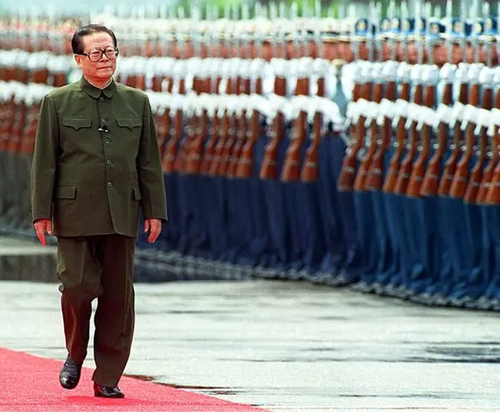Former Chinese President Jiang Zemin Who Ruled After Tiananmen Massacre Dies At 96
Former Chinese President Jiang Zemin, who came to power after the Tiananmen Square massacre, died on Wednesday at 96 of leukemia and multiple organ failure, state media reported.
Jiang Zemin passed away due to leukemia and multiple organ failure in Shanghai at 12:13 p.m. on Nov. 30, 2022, at the age of 96, it was announced on Wednesday
— China Xinhua News (@XHNews) November 30, 2022
Xinhua News Agency published an open letter by the ruling Communist Party, parliament, Cabinet, and the military, about the loss of the former president.
“Comrade Jiang Zemin’s death is an incalculable loss to our Party and our military and our people of all ethnic groups,” the letter read, expressing the announcement was with “profound grief.”
Zemin ascended to power after the 1989 Tiananmen Square protests and massacre that left at least 10,000 people dead, according to UK documents released by BBC News in 2017. Under his leadership (from 1993 to 2003), China peacefully regained Hong Kong in 1997 and entered the World Trade Organization in 2001.
His death comes as President Xi Jinping’s zero Covid policy has backfired, and worsening Covid outbreaks have sparked some of the worst social unrest since Tiananmen.
David Shambaugh’s 2021 book “China’s Leaders: From Mao to Now” said Zemin was first viewed as an ornamental “flowerpot” with a limited practical purpose.
“The initial foreign impressions of Jiang were that he was a dull, classic bureaucrat-apparatchik, lacking in intelligence and persona … As time passed and Jiang emerged on the world stage, it became quickly apparent that he was the very opposite of those descriptors.
“When compared with Xi Jinping’s hardline repression today, or Hu Jintao’s relatively limited impact, we look back wistfully on Jiang Zemin’s rule as relatively liberal and tolerant politically, socially and economically,” Shambaugh wrote.
Zemin continued to influence Chinese politics even after he stepped down in the early 2000s. In 2015, People’s Daily, the party’s flagship newspaper, warned retired leaders to sit on the sidelines and out of politics as Jinping was furious Zemin was wielding power behind the scenes.
“Jiang Zemin continued to wield influence even after he stepped down, but that hurt his reputation.
“He did that because he was comfortable with power, but also because around him there was a circle of people who relied on him and puffed him up to make him think he was indispensable,” Yang Jisheng, a Beijing historian, told NYTimes.
After Mao Zedong’s chaotic rule, Zemin was instrumental in formalizing a two-term limit for China’s leaders. However, last month, Jinping shattered the term limit as he positioned himself for lifetime dominance over the world’s second-largest economy.
Tyler Durden
Wed, 11/30/2022 – 08:55
via ZeroHedge News https://ift.tt/ElN1a2P Tyler Durden
